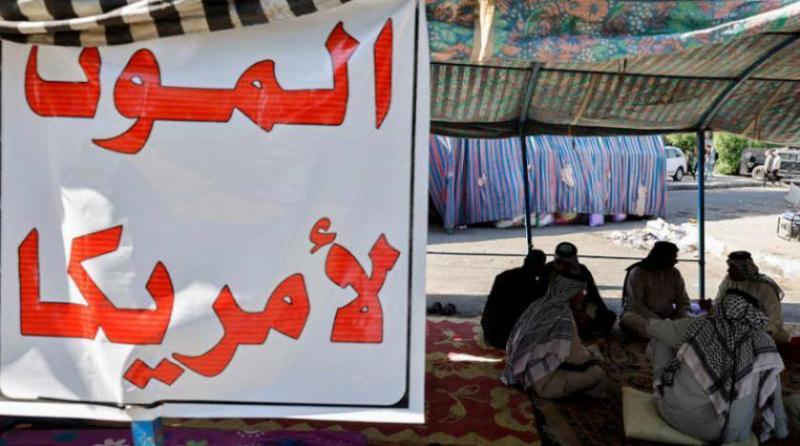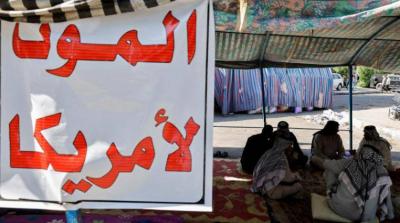Efforts for de-escalation in Iraq continued yesterday (Wednesday) after protests against the results of the recent elections turned into an open sit-in in front of the Green Zone gate in Baghdad. The losing parties are betting on the outcomes of the appeals submitted to the electoral commission before engaging in negotiations with other political parties.
The Iraqi Prime Minister and Commander-in-Chief of the Armed Forces Mustafa Al-Kadhimi reaffirmed yesterday the country's commitment to protecting the United Nations mission in Iraq and other diplomatic missions from any threats, supporting them in fulfilling their duties within the framework of Iraq’s adherence to international laws and norms. Al-Kadhimi reiterated during a meeting of the National Security Council Iraq’s firm position of rejecting being a launching pad for attacks on any other country. He stated that peaceful demonstration is a "constitutional right," and security forces have a duty to ensure the right to express opinions, provided it does not involve violating law and order, restricting citizens, blocking roads, disrupting public life, assaulting public or private property, or undermining the state's authority, according to the German news agency.
He added that "the government played a significant role in conducting the elections, and the security forces successfully secured the electoral centers, candidates, and voters, and the elections were held, for the first time, without a curfew, without explosives, assassinations, or terrorist acts," as stated in a government announcement.
Al-Kadhimi affirmed that objections to the election results must be within the legal procedures in place, which are the natural and sound legal course. He called on demonstrators to cooperate with security forces to perform their tasks in maintaining security and the flow of public life.
This comes at a time when the leader of the "Fateh Alliance," Hadi Al-Amiri, called on the Independent High Electoral Commission in Iraq to seriously consider all the appeals submitted to it to "reassure everyone and prove its complete neutrality." Al-Amiri stated in a press release: "There is no doubt that the demand for rights in peaceful and civilized ways and according to proper procedures is a constitutional right." He also thanked the demonstrators for their commitment to the peaceful nature of the protests and their high conduct with the security forces, urging them to maintain this peaceful approach and end the phenomenon of burning tires and blocking roads urgently, "as these matters must be considered with utmost precision," according to the German news agency.
The sit-ins of supporters of the Shia parties that lost many seats in the Iraqi parliament after the parliamentary elections on October 10 have entered their second day in front of one of the gates of the Green Zone in central Baghdad. The sit-in participants demand "manual recounting and sorting of the election results and addressing cases of fraud that accompanied the voting process."
Meanwhile, similar demonstrations broke out yesterday in the provinces of Babil, Wasit, Dhi Qar, and Diyala, echoing the same demands, according to the German news agency.
Concurrently with the losers' sit-in, the blocks and parties that achieved significant victories in the upcoming parliament began moves aimed at de-escalation. While the losing parties do not want to admit defeat and imply to their base that significant manipulation occurred in the election results warranting all this anger, the winning parties seek to commence procedures for holding the first parliamentary session and identifying the largest bloc before electing a new parliament speaker and president.
The apparent crisis is between Shia factions, with parties that obtained the highest seats, such as the Sadrist bloc led by Muqtada Al-Sadr, which secured 73 seats, pitted against other factions whose seats significantly declined, such as the "Fateh Alliance" led by Hadi Al-Amiri. Although the "State of Law Coalition" headed by former Prime Minister Nouri al-Maliki came in second among Shia factions with 33 seats, it considers itself part of the coordinating framework that rejects the election results. The Maliki coalition did not seek additional seats but aimed to absorb the losing factions to gain their seats in the context of its postponed confrontation with Sadr over the largest bloc to nominate a prime minister from its members.
According to information obtained by "Asharq Al-Awsat" from an informed source, the leader of the "Wisdom Movement" and head of the "State Forces," Ammar Al-Hakim, is currently leading de-escalation efforts among various parties. The source indicated that "things have not reached the negotiation stage yet, but there are attempts to stabilize the political situation to prevent further tensions."
Al-Hakim had met with Iraqi President Barham Salih the evening before. He also met yesterday with a delegation from the "Sadrist Movement" led by Hassan Al-Adhari, the head of the Sadrist bloc. A statement from Al-Hakim's office emphasized "the importance of national harmony and mutual reassurance messages among all parties," pointing out that "the elections were a means to help Iraq exit a previous political crisis, so the results must contribute to achieving the aspirations of the Iraqi people and their demands for services, job opportunities, and the preservation of the state and sovereignty." The statement also confirmed that the "Wisdom Movement" has "played and will play a role in bridging perspectives due to its good relations with all political blocs," indicating that "this role stemmed from our reading of the necessity to unite voices for the Iraqi interest primarily."
The losing parties in the elections, which have begun to strengthen their demonstrations in front of the Green Zone gate, announced their rejection of any negotiations before addressing the appeals they submitted to the Independent High Electoral Commission. While it remains unclear whether Al-Hakim's de-escalation efforts will yield positive results, the Sunni and Kurdish parties have similarly started to exert pressure on the other parties to complete the election process through government formation, despite the conviction among Shia factions that the Kurds and Sunnis cannot act independently of their Shia partners.
In this context, winning parliament member from the "State of Law" coalition, Muhammad Al-Suhod, stated that "the Sunni and Kurdish political blocs cannot form an alliance with Shia political forces while excluding other Shia political blocs. In other words, they cannot ally with the Sadrist bloc while leaving the (coordinating framework) forces." He clarified that "the Sunni and Kurdish political blocs are working to form the Iraqi government through alliances and negotiations with the Shia political consensus, a matter that these forces have been working on over the past years." He added that these blocs "are waiting for a unified Shia position before entering serious dialogues and negotiations regarding the formation of the new government."
Additionally, the "Electoral Judicial Authority" established in the "Supreme Judicial Council" has returned the appeals regarding the election results to the commission. The "Authority" attributed its decision to the fact that "the appeals came before the announcement of the final results." The "Authority" called on the Board of Commissioners to "announce the final results and await new appeals, and to unify the two appeals in principle in order to facilitate auditing and resolution within the legally specified timeframe."




